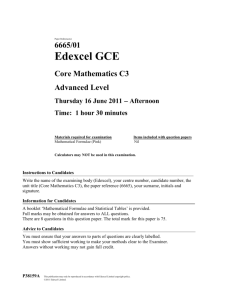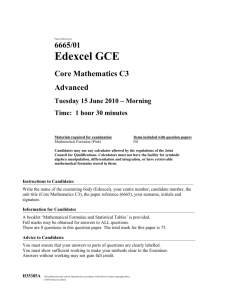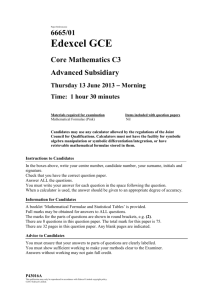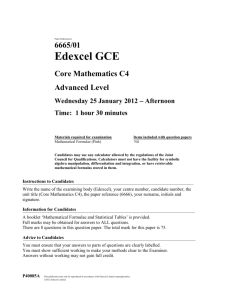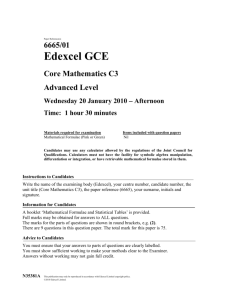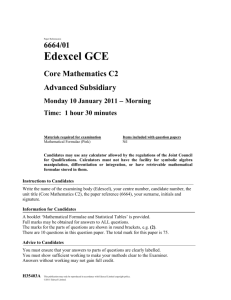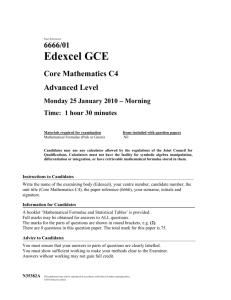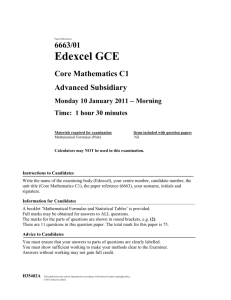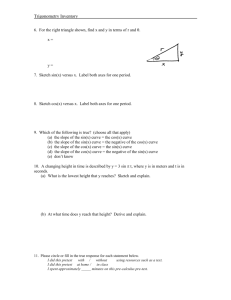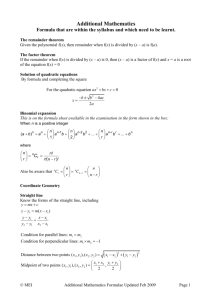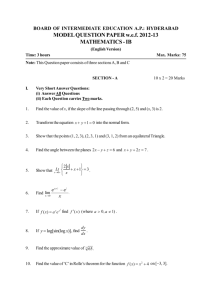Edexcel C3 Core Mathematics Exam Paper (Jan 2013)
advertisement
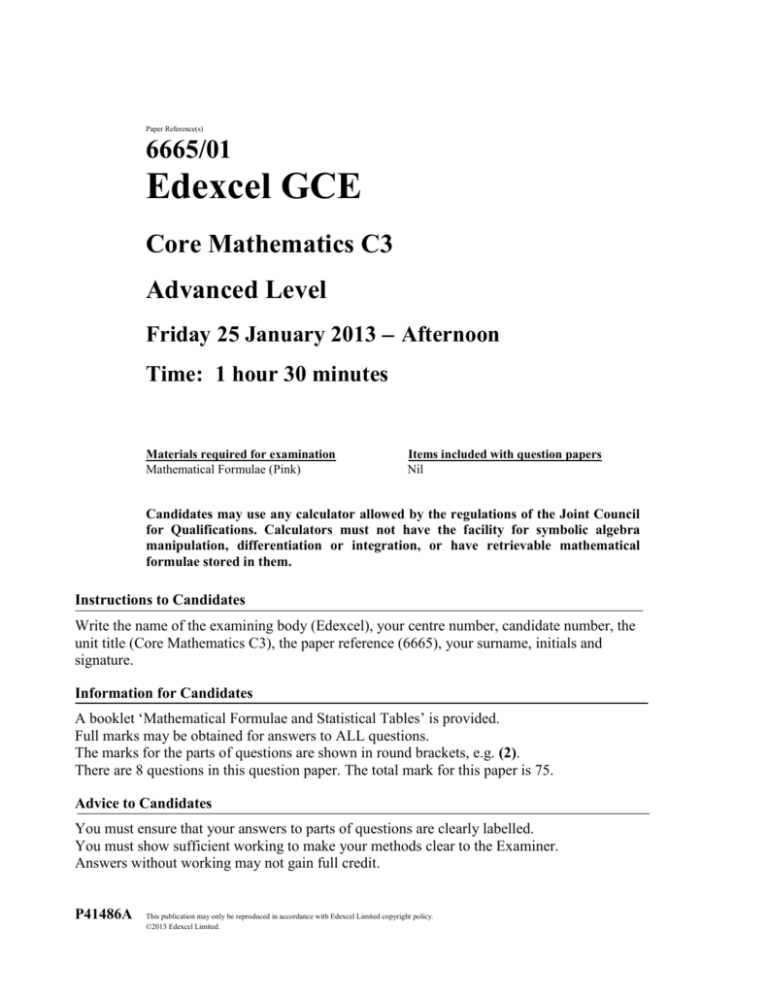
Paper Reference(s) 6665/01 Edexcel GCE Core Mathematics C3 Advanced Level Friday 25 January 2013 Afternoon Time: 1 hour 30 minutes Materials required for examination Mathematical Formulae (Pink) Items included with question papers Nil Candidates may use any calculator allowed by the regulations of the Joint Council for Qualifications. Calculators must not have the facility for symbolic algebra manipulation, differentiation or integration, or have retrievable mathematical formulae stored in them. Instructions to Candidates Write the name of the examining body (Edexcel), your centre number, candidate number, the unit title (Core Mathematics C3), the paper reference (6665), your surname, initials and signature. Information for Candidates A booklet ‘Mathematical Formulae and Statistical Tables’ is provided. Full marks may be obtained for answers to ALL questions. The marks for the parts of questions are shown in round brackets, e.g. (2). There are 8 questions in this question paper. The total mark for this paper is 75. Advice to Candidates You must ensure that your answers to parts of questions are clearly labelled. You must show sufficient working to make your methods clear to the Examiner. Answers without working may not gain full credit. P41486A This publication may only be reproduced in accordance with Edexcel Limited copyright policy. ©2013 Edexcel Limited. 1. The curve C has equation y = (2x − 3)5 The point P lies on C and has coordinates (w, –32). Find (a) the value of w, (2) (b) the equation of the tangent to C at the point P in the form y = mx + c , where m and c are constants. (5) g(x) = ex − 1 + x − 6 2. (a) Show that the equation g(x) = 0 can be written as x = ln (6 − x) +1, x < 6. (2) The root of g(x) = 0 is α. The iterative formula xn + 1 = ln (6 – xn) + 1, x0 = 2. is used to find an approximate value for α. (b) Calculate the values of x1, x2 and x3 to 4 decimal places. (3) (c) By choosing a suitable interval, show that α = 2.307 correct to 3 decimal places. (3) P41486A 2 3. Figure 1 Figure 1 shows part of the curve with equation y = f(x) , x ℝ. The curve passes through the points Q(0, 2) and P(−3, 0) as shown. (a) Find the value of ff (−3). (2) On separate diagrams, sketch the curve with equation (b) y = f −1(x), (2) (c) y = f(x) − 2, (2) (d) y = 2f 12 x . (3) Indicate clearly on each sketch the coordinates of the points at which the curve crosses or meets the axes. P41486A 3 Turn over 4. (a) Express 6 cos + 8 sin in the form R cos ( – α), where R > 0 and 0 < α < . 2 Give the value of α to 3 decimal places. (4) 4 , 12 6 cos 8 sin p( ) = (b) 0 2. Calculate (i) the maximum value of p( ), (ii) the value of at which the maximum occurs. (4) 5. (i) Differentiate with respect to x (a) y = x3 ln 2x, (b) y = (x + sin 2x)3. (6) Given that x = cot y, (ii) show that dy 1 = . dx 1 x 2 (5) 6. (i) Without using a calculator, find the exact value of (sin 22.5° + cos 22.5°)2. You must show each stage of your working. (5) (ii) (a) Show that cos 2 + sin = 1 may be written in the form k sin2 – sin = 0, stating the value of k. (2) (b) Hence solve, for 0 < 360°, the equation cos 2 + sin = 1. (4) P41486A 4 7. h(x) = (a) Show that h(x) = 18 2 4 + 2 – 2 , x2 x 5 ( x 5)( x 2) x 0. 2x . x 5 2 (4) (b) Hence, or otherwise, find h′(x) in its simplest form. (3) Figure 2 Figure 2 shows a graph of the curve with equation y = h(x). (c) Calculate the range of h(x) . (5) 8. The value of Bob’s car can be calculated from the formula V = 17000e−0.25t + 2000e−0.5t + 500. where V is the value of the car in pounds (£) and t is the age in years. (a) Find the value of the car when t = 0. (1) (b) Calculate the exact value of t when V = 9500. (4) (c) Find the rate at which the value of the car is decreasing at the instant when t = 8. Give your answer in pounds per year to the nearest pound. (4) TOTAL FOR PAPER: 75 MARKS P41486A END 5 Turn over
